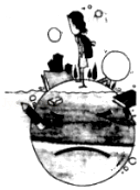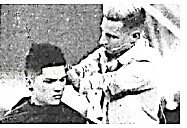At some point in life,many people develop a mental(精神) problem.While most people get over it,for others it doesn't go away easily.
The WHO says that about 20 percent of teenagers worldwide suffer from mental illness.It's thought that the number of teenagers with mental illness around the world will increase by half by 2020.It will become one of the main causes of illness,and even death.
In China,the picture isn't bright,either.About one tenth of teenagers under the age of 17 have a mental health challenge.
The world is changing fast.Study and relationships have always caused stress,but today the stress is much higher than before,the WHO said.
A research centre in Oxford University says that young people today have big stresses at school.For example,they experience bullying(欺凌).In a 2017 report,the centre noted that the Internet was a special source(渠道)of stress.Online,young people often see "messages about perfection" and this causes the young "great uncertainty about their futures",says the centre.
Also,according to China Daily,Chinese people don't ask for help with their mental problems.They fear that others will think less of them if they say that they are in mental trouble.Elaine Peng,a US mental health educator,makes a similar point.And in the UK,over three quarters of young people believe their mental problems have a social stigma.It is reported in 2017 that a quarter of young UK people wouldn't ask for help if they developed a mental problem.
Young people who don't ask for help for their condition may be creating problems for themselves in the future.Elaine Peng warned that,"If we hide our mental health,it may remain a problem forever."
"My message for young people is,if you feel something is wrong with you﹣ask for help,"he told China Daily.
(1)Which of the followings is NOT the cause of stress according to the passage?
A.Heavy schoolwork.
B.Being bullied at school.
C.Some information from the Internet.
D.Certainty about the future.
(2)Why don't Chinese people ask for help with their mental problems?
A.They don't think them serious.
B.They can get over them in time.
C.They can keep their mental health secret.
D.They are afraid of being looked down upon.
(3)What does the underlined word "stigma" most probably mean in Chinese?
A.羞耻
B.印象
C.援助
D.危害
(4)Elaine Peng advised the teenagers with mental illness to .
A.think less of themselves
B.avoid being bullied
C.ask for help as soon as possible
D.stay away from the Internet
(5)The main purpose of the passage is to .
A.ask research centres for help
B.tell about teenagers' stresses
C.call public attention on teenagers with mental illness
D.show some different opinions from different countries.


Shawnee Mountain is a wonderful place for___________.
Two parents and a child of 45cm tall will pay ___________for the lifts on weekend,
If a soldier goes to the mountain, ___________should be shown for a lift ticket.
It is known that people can go to Shawnee Mountain___________.
Which is NOT TRUE according to the passage?


 粤公网安备 44130202000953号
粤公网安备 44130202000953号